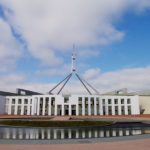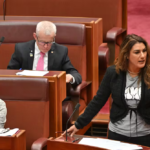Australia needs a national environment protection agency

Australia needs an independent national agency charged with safeguarding the environment and delivering effective climate policy, according to a new campaign launched by a coalition of environmental, legal and medical NGOs.
Most Western democracies have established national regulatory action, such as the US Environmental Protection Agency – yet Australia is a notable exception.
On March 27th in Canberra, the Australian Panel of Experts on Environmental Law (APEEL) held a symposium on the reform of environmental laws in Australia. If enacted, these proposals would offer protection to Australia’s declining biodiversity and environment, as well as helping to safeguard Australians’ health.
The proposal would involve establishing a high-level Commonwealth Environment Commission (CEC) that would be responsible for Commonwealth strategic environmental instruments, in much the same way that the Reserve Bank is in charge of economic levers such as interest rates.
The new CEC would manage a nationally coordinated system of environmental data collection, monitoring, auditing and reporting, the conduct of environmental inquiries of a strategic nature, and the provision of strategic advice to the Commonwealth government on environmental matters, either upon request or at its own initiative.
The necessary outcomes would then be delivered by government and ministers via a newly created National Environmental Protection Authority (NEPA).
This call will be echoed by a major alliance of leading environmental groups, including Doctors for the Environment Australia. Similar to the CEC/NEPA proposal, this group has called for an independent “National Sustainability Commission” that would develop conservation plans, monitor invasive species, and set nationally binding air pollution standards and climate adaptation plans.
The new body would replace the EPBC Act, which has failed to deliver the protections it promised in key areas such as land clearing and species protection, and has no role in limiting climate change which is a major factor in species loss.
The new agencies would be in a position to provide authoritative and understandable consensus reports, similar to those produced by the Intergovernmental Panel on Climate Change but with a stronger legal basis on which the government should act on its advice.
Why change the system?
The rationale for reform is clear. Only last week the International Energy Agency reported that Earth’s greenhouse emissions have increased yet again. Meanwhile, extreme weather events have increased, while wildlife diversity is on the decline.
Having failed so far to arrest these trends, the governments of countries with high standards of living and high greenhouse emissions should be held particularly accountable. Clearing land and burning forest for firewood are understandable survival strategies for the poor, but unacceptable in rich nations.
Australia’s national laws would be strengthened to address the challenge of climate change and ensure we can mitigate, adapt to and be resilient in the face of a warming world.
Action on climate change, essential to protect biodiversity, is also vital to protect human health as a quarter of world disease has its root causes in environmental change, degradation and pollution.
The World Health Organisation regards climate change as the greatest health threat of the 21st century, a view recognised by the statements of the Australian Medical Association and Doctors for the Environment Australia.
Already, it is responsible for thousands of deaths worldwide, and that figure is projected to rise to 250,000 by 2030. In Australia, air quality reform could prevent an estimated 3,000 air pollution deaths per year.
Causes of current inaction
There are fundamentally two causes of inaction. First, in this increasingly complex world, governments now more than ever need impartial advice based on the best available evidence. Yet all too often, such advice is politicised, ignored, or both.
Second, in leading democracies – particularly in Australia with its relatively short election cycles – the pressure to focus on re-election prospects dictates that governments emphasise jobs, growth, and living standards. It takes strong leadership to promote the interests of future generations as well as current ones.
It seems counterintuitive to suggest that for its survival, a government might need to delegate decisions for human survival to systems beyond its immediate political control. Yet it already does delegate crucial decisions, such as the monthly interest rate calls made by the Reserve Bank.
A newly created CEC and NEPA would be charged with safeguarding the climate, wildlife, fresh water and clean air. It would be in a position to improve air quality to standards recommended by the World Health Organization, protect water quality, and deliver effective climate change mitigation and adaptation policy uniformly in all states.
The success of such a national system would manifest itself in a growing number of decisions similar to the recent rejection of the expansion of Stage 3 of the Acland coal mine. The judge in that case turned it down on the basis of a range of health and environmental transgressions, yet it is currently more common for states to approve this type of developments rather than reject them.
Nationally enforceable standards for resource developments are likely to bring effective preventative health benefits, as well as certainty of process. These reforms present an overdue opportunity for Australia to offer leadership and catch up on lost time, to ameliorate the progression of climate change and biodiversity loss, and thus lessen their future impacts.
This article was originally published on The Conversation. Read the original article.
Dr David Shearman is Emeritus Professor of Medicine at the University of Adelaide and the Honorary Secretary and founder of Doctors for the Environment Australia.













Max Thomas
April 1, 2018 at 1:04 pm
There are calls for ‘non-political’ bodies to set standards and priorities in health, environment and education etc. Presumably, these ‘political antibodies’ would also control funding and enforcement, where necessary. If the suggested functions are to be carried out by unelected bureaucrats then who, if not politicians, will appoint them? Perhaps a popular President installed by the Murdoch press?
The USEPA operates under very different constitutional arrangements than the Australian agencies. They have done a great deal of valuable work that still benefits other countries, including Australia. The Trump administration is attempting to destroy the USEPA. However, the reactionary behaviour of Trump and his minions will be swept aside by the historic forces that drive the demand for improved environmental stewardship.
We already have national standards e.g. ANZECC water quality guidelines and the National Environment Protection (Ambient Air Quality) Measures etc, which are reflected in state laws, regulations and policies. Specifically, what would national legislation include or exclude that isn’t already covered by state environmental legislation? It’s hard to imagine how anything resembling the Commonwealth EPBC Act, the way it operates in practice, would be good for the environment. And nobody, surely, would suggest using the Murray-Darling Basin Authority as a model for independent environmental management by the Commonwealth.
An Australian Commonwealth EPA would have to be accountable to the government of the day and to the elected representatives of the people i.e. the Parliament, that’s how responsible government works. As clumsy as the federation is, at least the states serve to compensate for the inability of Canberra to govern effectively. It is especially ironic that the states should have to deal with an increasingly unrepresentative and fragmented Senate.
Max Thomas
April 1, 2018 at 3:13 pm
A major alliance of leading environmental groups, including Doctors for the Environment Australia, has called for an independent “National Sustainability Commission” to be ‘responsible for Commonwealth strategic environmental instruments, in much the same way that the Reserve Bank is in charge of economic levers such as interest rates’. In case these ‘leading environmental groups’ haven’t noticed, the RBA has very few ‘levers’ remaining for it to pull. Tinkering with interest rates is politically fraught and affects only a narrow section of the economy. The proposed new Commonwealth Environment Commission (CEC) would quickly run into the real multi-national economic drivers before they could shift the lever to first gear.
Which lever would the CEC pull to approve or refuse a proposed offshore windfarm at Corner Inlet near Wilsons Prom? The project would be close to an internationally-recognised breeding sanctuary for migratory birds that cross those waters in great numbers. And would the CEC advocate investigation of promising geothermal energy resources in the Latrobe Valley despite the Victorian state government’s drilling embargo?
‘Doctors for the Environment Australia’ evidently seeks to increase its influence over government policy. Fair enough, there can be no meaningful discussion of health without reference to the environment. But, as I have pointed out in ‘Open Forum’ previously, it is imperative that evidence must always be placed ahead of political objectives.
https://www.openforum.com.au/on-coal-seam-gas-fracking/
https://www.openforum.com.au/Further-evidence-that-coal-fired-power-has-reached-its-use-by-date